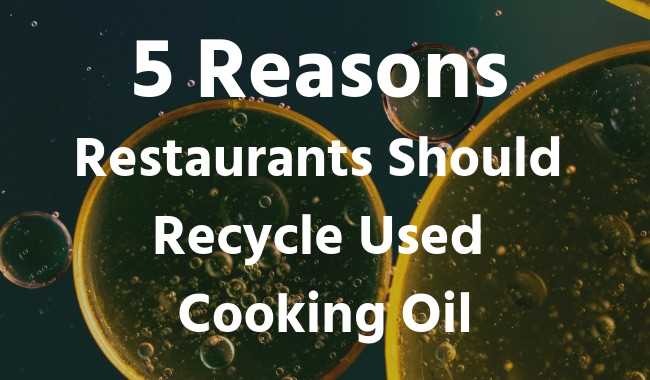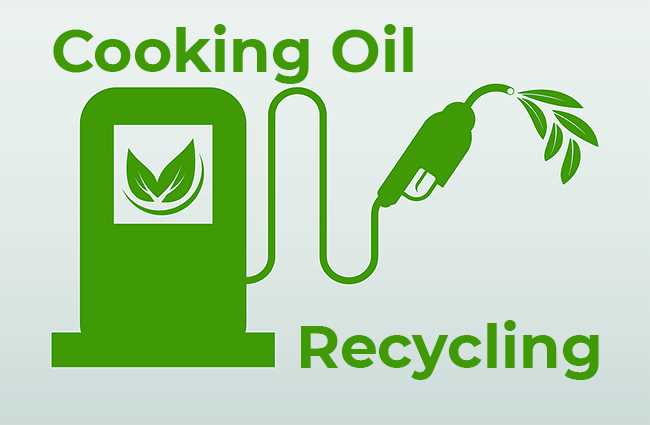



When it comes to conscious consumption and sustainability, recycling is a topic that often comes up. People are becoming increasingly aware of the importance of recycling and its positive impact on the environment. But what about cooking oil? Is it something that can be recycled?
The answer is yes, cooking oil can indeed be recycled. Recycling cooking oil not only helps reduce waste but also has other benefits. Used cooking oil, if not disposed of properly, can cause serious harm to the environment. When poured down the drain, it can clog pipes and sewers, leading to costly repairs. Moreover, when cooking oil is discarded in landfills, it can contaminate soil and water sources. Recycling offers a sustainable solution to this problem.
So, how exactly is cooking oil recycled? The process involves collecting the used oil and sending it to a recycling facility. Here, the oil goes through a filtration process where impurities are removed. Once purified, the oil can be used for a variety of purposes. It can be converted into biodiesel, a renewable and environmentally friendly alternative to traditional diesel. It can also be used in manufacturing soap, candles, and animal feed. Recycling cooking oil not only reduces waste but also contributes to the creation of renewable energy sources and reduces dependence on fossil fuels.
In conclusion, recycling cooking oil is not only possible but also beneficial for both the environment and the economy. By recycling this commonly used household item, we can reduce waste, prevent pollution, and promote sustainability. So, the next time you have used cooking oil, remember to recycle it instead of disposing of it improperly. Together, we can make a difference.
Can Cooking Oil Be Recycled?

When it comes to disposing of used cooking oil, many people wonder if it can be recycled. The short answer is yes, cooking oil can be recycled, but it is important to take the proper steps to ensure it is done correctly.
Why recycle cooking oil?
Recycling cooking oil has several benefits. Firstly, it helps to reduce the environmental impact of improper disposal. When cooking oil is poured down the drain or into the trash, it can clog pipes or contaminate water sources. Additionally, recycling cooking oil can be turned into biodiesel, which is a renewable source of energy. By recycling cooking oil, you are helping to reduce dependence on fossil fuels and contribute to a more sustainable future.
How to recycle cooking oil?
Recycling cooking oil is a relatively simple process. Here are the steps to follow:
- Allow the cooking oil to cool completely.
- Use a funnel to pour the oil into a clean, plastic container with a tight-fitting lid.
- Seal the container tightly.
- Contact your local recycling center or waste management facility to inquire about their specific guidelines for recycling cooking oil.
- Follow the guidelines provided by the recycling center to properly dispose of the cooking oil. This may involve dropping it off at a designated location or scheduling a special pickup.
What happens to recycled cooking oil?
Once recycled cooking oil is collected, it goes through a process to remove impurities and contaminants. It is then transformed into biodiesel, which can be used as a fuel source for vehicles and machinery. Some recycling facilities also convert cooking oil into other products, such as soap or animal feed. The exact uses and processes can vary depending on the recycling facility and their capabilities.
| Benefit | Description |
|---|---|
| Reduces environmental impact | Properly recycling cooking oil prevents clogs in pipes and contamination of water sources. |
| Creates renewable energy | Cooking oil can be transformed into biodiesel, reducing dependence on fossil fuels. |
| Creates other useful products | Recycled cooking oil can be used to make soap or animal feed. |
In conclusion, recycling cooking oil is not only possible but also beneficial for the environment. By following the proper steps to recycle cooking oil, you can help reduce waste and contribute to a more sustainable future.
The Environmental Impact of Cooking Oil Disposal
Disposing of cooking oil improperly can have significant negative effects on the environment. When cooking oil is poured down the sink or toilet, it can cause clogs and blockages in the plumbing system, leading to costly repairs.
In addition to the problems it causes within the home, improperly disposed of cooking oil can also contaminate water sources and harm aquatic life. When oil enters rivers, lakes or oceans, it forms a thin film on the water’s surface, preventing oxygen from reaching marine plants and animals. This can suffocate fish and other organisms, disrupting the entire ecosystem.
Furthermore, when cooking oil is thrown into the trash or dumped onto the ground, it can seep into the soil and contaminate it. This can have long-term effects on plant growth and soil health, as well as contribute to groundwater pollution. In some cases, contaminated soil may also require expensive remediation efforts to restore it to a usable state.
It is important to properly dispose of cooking oil to minimize its environmental impact. One eco-friendly option is recycling. Many recycling centers and facilities accept used cooking oil and can repurpose it for various purposes. Recycling cooking oil prevents it from entering the waste stream and reduces the need for virgin oils, which in turn helps conserve natural resources and reduce greenhouse gas emissions.
If your local recycling options do not include cooking oil, it is recommended to store the oil in a sealable container and dispose of it in the garbage. Be sure to check your local regulations and guidelines for proper disposal methods in order to avoid causing harm to the environment.
Benefits of Recycling Cooking Oil

Recycling cooking oil offers numerous benefits, both for the environment and for individuals. Here are some of the key advantages:
1. Environmental Benefits:
Properly recycling cooking oil helps to prevent it from ending up in landfills, where it can contribute to soil and water pollution. When cooking oil is recycled, it can be converted into biodiesel, a renewable source of energy. Biodiesel produces fewer greenhouse gas emissions compared to traditional fossil fuels, making it a more environmentally friendly option.
2. Resource Conservation:
By recycling and reusing cooking oil, valuable resources are conserved. Instead of discarding used oil, it can be cleaned and processed to be used again, reducing the need for new oil production. This helps to conserve natural resources and reduces the overall demand for cooking oil.
3. Economic Benefits:
Recycling cooking oil can have economic advantages for communities and businesses. The production of biodiesel from recycled cooking oil can create jobs in the green energy sector and contribute to local economies. Additionally, businesses that recycle cooking oil may be eligible for tax incentives or other financial benefits.
4. Prevents Drain and Sewer Blockages:
Pouring used cooking oil down the drain can lead to clogged pipes and sewer blockages. By recycling cooking oil instead, these potential issues can be avoided. Properly disposing of cooking oil can help to keep the plumbing system functioning efficiently and prevent costly repairs.
5. Health and Safety:
Recycling cooking oil promotes health and safety. When cooking oil is disposed of improperly, it can attract pests and insects, leading to potential health hazards. By recycling cooking oil, these risks can be minimized and the overall cleanliness and safety of the community can be improved.
In conclusion, recycling cooking oil offers a wide range of benefits, including environmental conservation, resource preservation, economic advantages, prevention of drain blockages, and improved health and safety. By properly disposing of used cooking oil, individuals and communities can contribute to a more sustainable and healthier future.
Options for Recycling Cooking Oil
There are several options available for recycling cooking oil, which can help reduce its negative environmental impact and promote sustainability. Here are a few options to consider:
1. Municipal Recycling Programs: Many cities and towns offer recycling programs specifically for cooking oil. These programs typically involve drop-off locations where you can dispose of your used oil. The oil is then collected and sent to recycling facilities where it can be processed and reused.
2. Private Collection Services: Some private companies specialize in collecting and recycling used cooking oil. These companies often provide collection containers or barrels that can be placed in restaurants, commercial kitchens, or even individual homes. The collected oil is then taken to specialized facilities for recycling.
3. Biodiesel Production: Used cooking oil can also be converted into biodiesel, a renewable fuel source that can be used to power vehicles and machinery. Biodiesel production involves a process called transesterification, where the oil is chemically treated to separate glycerin from the fatty acids. The resulting biodiesel can be blended with regular diesel fuel or used as a standalone fuel.
4. Composting: If you have a composting system, you can also recycle small amounts of cooking oil by adding it to your compost pile. It’s important to note that only small quantities of oil should be added to avoid overwhelming the composting process. Oil should be mixed well with other compostable materials to prevent clumping and promote decomposition.
5. Repurposing: In some cases, used cooking oil can be repurposed for non-edible uses. For example, it can be used as a lubricant or as an ingredient in soap or candle-making. However, it’s important to ensure that the oil is free from contaminants and has been properly filtered before using it for these purposes.
Remember that it’s essential to properly store used cooking oil before recycling it. This includes allowing the oil to cool completely, transferring it to a proper container with a tight-fitting lid, and keeping it separate from other waste materials. By recycling your cooking oil, you can help protect the environment and contribute to a more sustainable future.
Question-answer
Can I recycle cooking oil?
Yes, cooking oil can be recycled. It can be reused or converted into biofuel.
What can I do with used cooking oil?
You have a few options for disposing of used cooking oil. You can recycle it by taking it to a recycling facility or drop-off location, use it to make biodiesel, or donate it to organizations that accept used oil for various purposes.
Is recycling cooking oil beneficial for the environment?
Yes, recycling cooking oil is beneficial for the environment. It helps reduce waste and prevents oil from clogging drains and causing pollution. Additionally, it can be converted into biofuel, which is a cleaner alternative to traditional fossil fuels.
Where can I recycle cooking oil?
You can recycle cooking oil at designated recycling facilities, local drop-off locations, or through special recycling programs offered by your city or town. Some supermarkets and restaurants may also have collection points for used oil.
What happens to recycled cooking oil?
Recycled cooking oil can be processed and converted into biodiesel, which can be used as a renewable energy source. It can also be used in the production of animal feed, cosmetics, and other industrial products.
Can cooking oil be recycled?
Yes, cooking oil can be recycled. Recycling cooking oil is an environmentally friendly way to dispose of it and prevent it from clogging drains and damaging the environment.
What can recycled cooking oil be used for?
Recycled cooking oil can be used for various purposes. It can be converted into biodiesel, which is a renewable source of energy. It can also be used in the production of animal feed, soaps, and detergents.






